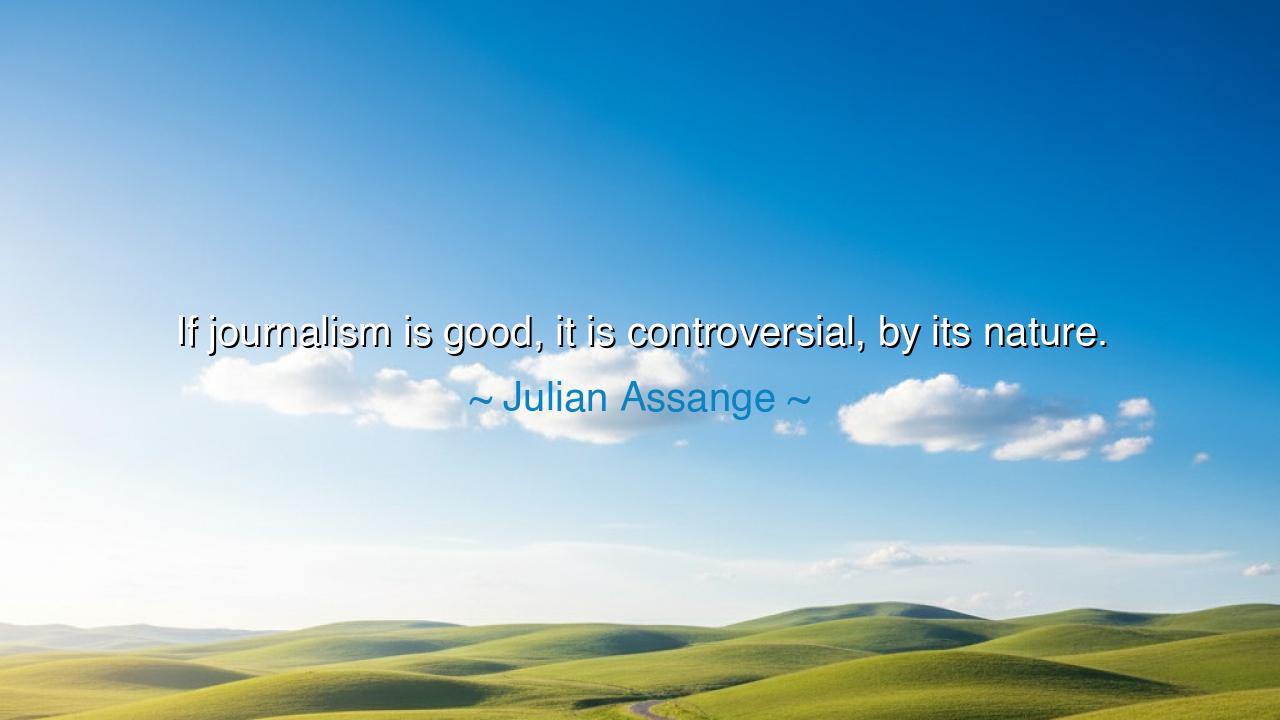
If journalism is good, it is controversial, by its nature.






Hearken, O seekers of truth and chroniclers of events, to the words of Julian Assange, who proclaimed: “If journalism is good, it is controversial, by its nature.” In these words lies a profound meditation on the essence of inquiry, courage, and revelation. The ancients understood that the pursuit of truth often incites discomfort, challenges authority, and provokes debate. To illuminate hidden realities is never a passive act; it is an engagement with the powerful, the secretive, and the complacent, and it carries the weight of both admiration and outrage.
Assange, the modern harbinger of transparency, speaks from a realm where information confronts secrecy, where revelation disrupts complacency, and where the act of exposing hidden truths inevitably stirs controversy. The principle he articulates is timeless: to challenge the accepted narrative, to question rulers or institutions, and to reveal that which is hidden is inherently provocative. The true measure of journalism is not comfort or consensus, but the courage to illuminate the shadows.
Consider the meaning of controversy in this context. It is not born of frivolity or sensationalism, but of moral and civic courage. Good journalism unsettles, forcing society to confront truths that may be inconvenient or uncomfortable. The ancients chronicled similar acts: Socrates questioned the Athenian polis and was condemned for his pursuit of truth; Plato recorded his dialogues not to entertain, but to provoke thought and reflection. Controversy, then, is the natural companion of moral inquiry.
History provides vivid examples. Recall Ida B. Wells, the intrepid journalist who documented lynching in the post-Reconstruction American South. Her revelations were controversial, angering those in power and endangering her life. Yet her courage exposed injustice and sparked a movement for civil rights. Like Assange, she understood that the essence of good journalism lies in its willingness to confront entrenched power, to disturb complacency, and to demand accountability.
The essence of this quote also speaks to the duty of the observer. To witness without acting, to record without questioning, is a betrayal of the soul of the craft. True journalism, like philosophy or epic storytelling, pierces the veil of convenience, revealing the hidden patterns of society. The ancients revered those who spoke truth to power, whether through oratory, scroll, or song, recognizing that society thrives not on silence but on the clarity of illuminated knowledge.
O listener, grasp the lesson here: to pursue truth is inevitably to court controversy. Avoiding discomfort may protect one from anger or criticism, but it also silences the voice that matters. The path of good journalism, and indeed of moral courage in any endeavor, demands that one stand firm in the face of resistance, valuing integrity and revelation above the fleeting comfort of consensus.
Practical guidance flows naturally from this reflection. Seek the truth in all matters, even when inconvenient, unpopular, or contested. Speak it boldly, record it faithfully, and resist the temptation to soften or conceal reality for the sake of appeasement. Embrace controversy as a signal that your work challenges assumptions, illuminates hidden patterns, and fulfills its true purpose.
Thus, O seeker, engrave this wisdom upon your heart: good journalism is never timid, never purely agreeable, and never safe. Its nature is to provoke, to question, and to reveal. Let this truth guide your own pursuits, whether in writing, observation, or action, for to embrace controversy born of integrity is to participate in the eternal struggle for knowledge, justice, and the illumination of the human soul.






AAdministratorAdministrator
Welcome, honored guests. Please leave a comment, we will respond soon